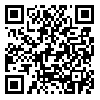Volume 12, Issue 2 (3-2011)
yafte 2011, 12(2): 0-0 |
Back to browse issues page
Download citation:
BibTeX | RIS | EndNote | Medlars | ProCite | Reference Manager | RefWorks
Send citation to:



BibTeX | RIS | EndNote | Medlars | ProCite | Reference Manager | RefWorks
Send citation to:
Toulabi T, Alhani F. A comparative study of educational programs’ objectives for professional needs from the viewpoints of nursing graduates in three periods of three years. yafte 2011; 12 (2)
URL: http://yafte.lums.ac.ir/article-1-315-en.html
URL: http://yafte.lums.ac.ir/article-1-315-en.html
Tarbiat Modares University, Tehran, Iran
Abstract: (12547 Views)
Since graduates are the core of educational activities, investigating their viewpoints on clinical, communication, and management abilities to play professional roles can help to promote educational programs. Researches have reported different results from the viewpoints of nursing graduates about the effects of acquired skills during their academic years on their performance and professional needs. The present study was conducted to determine the comparison of educational programs' objectives for professional needs from the viewpoints of nursing graduates in three periods of three years.
Materials and Methods: This descriptive, cross-sectional study was performed in the year 2009 on 354 nursing graduates who had graduated from Khorramabad , faculty of nursing and midwifery n the continuous and discontinuous undergraduate courses from 1999 to 2007. Out of 354 posted questionnaires, 222 questionnaires were returned. They were considered in terms of three periods of three years, including 1999-2001 as the first period, 2002-2004 as the second period and 2005-2007 as the third period. The data collection tool was a questionnaire including personal information, appropriateness of educational programs' objectives for professional needs, satisfaction with educational programs and necessity to change them, factors influencing the quality of educational programs from the viewpoints of graduates, and educational and research activities related to after-graduation fields, which was mailed to the participants and completed by them. The data was analyzed using descriptive statistics and Chi-square tests.
Results:Most of the first period graduates (74.2%) evaluated their competencies in taking care of patients as high, while those in the second (72%) and third (57.9%) periods represented a reduction. Most of the graduates of the first period (62.2%) considered the training courses more effective on professional efficiency compared to practical (48.9%) and theoretical (51.1%) courses, and in the other periods the influence of theoretical and training courses tended to decrease.
The majority of the graduates in the first period believed that 50% of their acquired skills during their academic years moderately fulfilled their professional needs, while in other periods a decreasing trend was found.
The Chi-square test did not reveal any significant differences between the three periods. The factors affecting the quality of educational programs from the viewpoints of the graduates were as follows: qualified faculty members and instructors (73%), educational environment (67.6%), facilities for clinical education (66.2%), applied teaching methods (59.9%), and the availability of scientific resources (59.9%), but Chi-square tests did not show any significant differences between the three periods, except for resources.
Conclusion: The comparison of educational programs' objectives for professional needs shows a decreasing trend therefore, revising nursing education is recommended to enhance the competency of graduates for patient care, to use more theoretical, training and practical courses in the professional performance, and to increase essential skills in order to respond to professional needs.
Type of Study: Research |
Received: 2011/03/6 | Accepted: 2021/10/13 | Published: 2011/03/15
Received: 2011/03/6 | Accepted: 2021/10/13 | Published: 2011/03/15
Send email to the article author
| Rights and permissions | |
 |
This work is licensed under a Creative Commons Attribution-NonCommercial 4.0 International License. |





